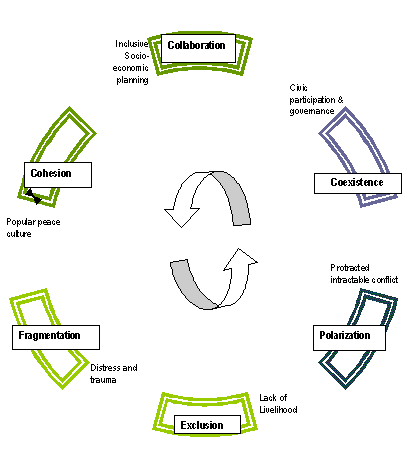E-Dialogue "Creating an Inclusive Society: Practical Strategies to Promote Social Integration"
Stages of Social Relations:
Social relations are characterized by the quality of interactions among people within a society. The following framework, devised by the Department of Economic and Social Affairs of the UN Secretariat, helps to assess levels of social integration by examining the state of social relations.
It identifies six stages of social integration, which are formulated as stages of social relations. It invites stakeholders to explore different stages of social relations – both negative (lower half of circle) and positive (upper half). This framework is meant as a heuristic device for suggesting the general processes involved in moving towards peaceful social relations.
Stages of social relations:
-
Fragmentation, which arises in situations of abuse, armed conflict, and social breakdown. In this case, social relations disintegrate (most profoundly at the psychological level), giving rise to healing;
-
Exclusion, which arises where there is neglect or oppression. In this case, social relations are asymmetrical, giving rise to inclusion strategies that build self-help and livelihood capacities;
-
Polarization, which arises when groups can mobilize. In this case, social relations are hostile, combative (most profoundly at the level of religious/ethnic identity), giving rise to mediation/reconciliation;
The transition from polarization to coexistence is pivotal. It is when the focus shifts from healing and mending social relations to investing in strengthening relationships.
The stages of coexistence, collaboration, and cohesion – presented in the upper half of the circle – are described as expansive, carrying the potential for more advanced social relations. More specifically:
-
Coexistence, which arises with tolerance of difference i.e. social relations revolve on civic dialogue;
-
Collaboration arises with a widening sense of socio-economic justice, that is to say, social relations lead to participatory development planning;
-
Cohesion arises with peace-culture, that is to say, social relations support discovery/creation of shared meaning and value while respecting and even celebrating diversity.
.
